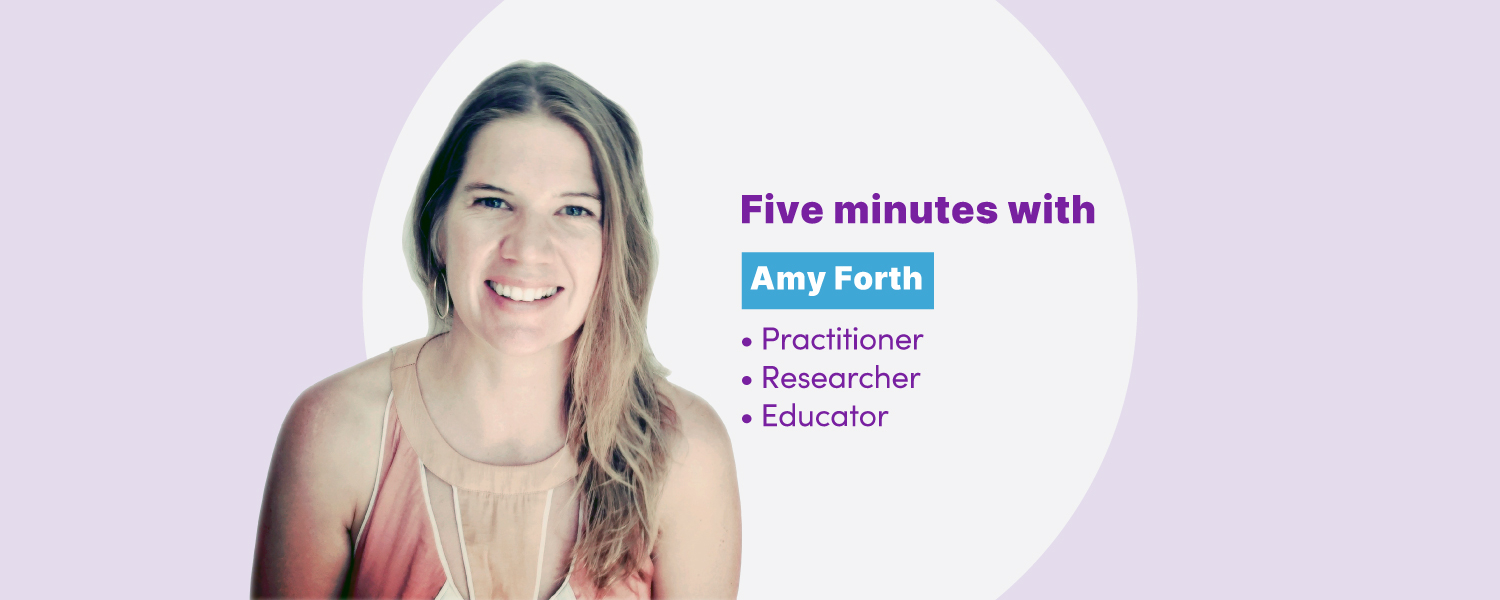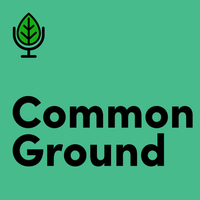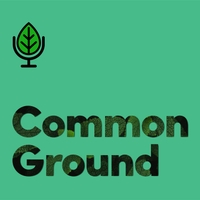
5 minutes with Amy Forth; BHSc (TCM) and MGHDS (Global Health)
What is your background and how did you come to focusing on acupuncture for fertility and IVF? Well, I feel my story is one of those stories, which you've heard repeatedly and from people who end up working in a field and that is because you have some experiences yourself with your own health. For me, it was not so much fertility but women's health. When I was about 17, I suddenly just stopped getting a period and I was really health conscious and so I was concerned about not getting a period. I went down a rabbit hole of like trying to work out why. I saw my GP and I saw a gynaecologist and no one could really give me an answer. I ended up seeing a Chinese medicine practitioner and you've probably already guessed how this story ends. I started getting my periods back after about two sessions of acupuncture. This was after about a year of trying lots of different things. I was just really impressed and just finishing up high school and was thinking about what I was going to study and then I went on to study Chinese medicine.
The whole way through I had a women's health lens and learnt that Chinese medicine can offer many treatments and therapy for women’s health which are often a grey area of treatment in medicine. I found women with PCOS, endometriosis, amenorrhea, all these kind of women's health issues that Chinese medicine had a lot to offer. My studies become very focused on women's health throughout my four years of studying Chinese medicine. Then when I graduated, I started working in a clinic and it very quickly became a women's health-focused clinic and I worked quite closely with an obstetrician and gynaecologist. Then I moved into a bigger clinic in Melbourne where I focused on IVF, fertility and women's health and fast forward a few years later when I started working at Jane Lyttleton’s clinic. I had recently moved to Sydney a few years later to do my Masters and had a meeting with Jane and I guess one thing just sort of led to another and I ended up working with her and for her, and then becoming the director of the Acupuncture Pregnancy Clinic in Alexandria, working alongside IVF Australia. I've always been very interested in integrative health, so it's great where our clinic is located, that we still share and have those relationships with doctors and share patients and offer care alongside mainstream medicine.
What research is there to support the use of acupuncture and fertility, for both men and women? There is research around both female and male fertility. Generally, we find with patients and often in the medical profession, the burden (of fertility) is greatly stacked towards the female and so women tend to be the people who seek more acupuncture and Chinese medicine treatment. Female fertility research suggests acupuncture can be helpful just in terms of improving vasodilation and improving blood flow to the ovaries and the uterus. Acupuncture can help induce the neurotransmitters, which activates the GnRH, which increases ovulation, menstrual regularity, and enhance overall fertility. Acupuncture also has some great mechanisms in terms of stress response and mitigating adverse stress response by reducing cortisol and increasing endogenous opioids and endorphins and all those kinds of feel good chemicals.
So those are some of the things that have been researched about acupuncture and how it can help with infertility, more specifically around female fertility.
What research is there Amy for the use of acupuncture for IVF? IVF acupuncture became quite popular in 2002 after a paper was published by Paulus who looked at doing acupuncture immediately before and after embryo transfer. The study showed that acupuncture improved the clinical pregnancy rate (CPR) and the acupuncture group yielded 42.5% CPR versus 26.3% in usual care. This was the beginning of acupuncture being quite popular and quite often used alongside IVF. However, since then, there have been quite a lot of studies done and some of them have mirrored what Paulus did - just doing their embryo transfer acupuncture before and after - and then others have done the more kind of comprehensive, like higher dose, i.e. more acupuncture before IVF cycle and during an IVF cycle.
The latest meta-analysis which came out again from the Western Sydney University team had a look at the research around IVF acupuncture and what they found in the studies is that the dose of acupuncture, i.e. how many acupuncture sessions, was a significant modifier on pregnancy outcomes. Specifically this study found more than three acupuncture treatments showed (even if they were compared to a control that was a placebo or sham acupuncture) a significant increase in clinical pregnancy rates. However less than three acupuncture sessions did not. Another study, which we often look to in terms of how we operate in the clinic, is a study by Hullander, who was an American researcher. She did a retrospective cohort study that was published in 2015 and she looked at over a thousand women. She looked at the women who had used what she called “Whole Systems Traditional Chinese medicine” (WSTCM) and this was when they not only just had acupuncture, but they also may have had herbs and they may have had nutritional supplements depending on what was appropriate for the patient. They found the patients who had on average 12 acupuncture treatments, including herbs and supplements where appropriate, had an increased proportion of live births (which is, of course, a completely different measurement to just the clinical pregnancy rates) by 61.3%. This is quite significant.
So when we see our patients at the clinic we often try and adopt an approach similar to this – an holistic approach with appropriate herbs and supplements, and treating them with acupuncture, not just with a protocol but holistically and individually, according to their fertility pattern and enhance their fertility according to Chinese medicine. So, at our clinic, we go on the Hollander research and I have to say that since that came out in 2015 this is how my practice has been heading and the results are very satisfying.
Do you often find that you do a mix of acupuncture or do you refer to other healthcare professionals when someone is suffering say anxiety and/or depression? In general, we really like to work collaboratively. I often think that women undergoing particularly fertility treatment or even if they're just trying to conceive naturally, it can be extremely stressful. Some studies have shown that it's as stressful as undergoing cancer treatment. I think that gives us a real idea about the psychological strain on someone trying to conceive. For women who are doing IVF, they can often access counsellors for free as a part of their cycle, so we often will recommend that they take advantage of that. In terms of what acupuncture can do, something that has consistently shown up in a lot of research is that acupuncture can really help women who undergo IVF in terms of their anxiety and their overall emotional resilience in particular.
There was a randomised control trial that was published in 2018 by Western Sydney University. In this randomised control trial, they had an arm of the trial that was sham acupuncture and another that was regular acupuncture, so the participants weren't sure whether they were getting sham or if they were getting regular acupuncture. This study showed a significant psychological benefit for women who undertook the acupuncture, both the sham group and the acupuncture group had improved a sense of wellbeing and a reduction in anxiety. However, significantly an increased proportion in the acupuncture group had an even bigger benefit i.e. lower stress and anxiety. So that was an interesting study, and we know from the research that acupuncture really helps increase those endogenous opioids such as endorphins and serotonin, all those kinds of feel-good hormones and it helps reduce cortisol and adrenaline levels. So often after an acupuncture session, women will come out and just say, ‘I just can't believe how I feel’. You know, if they're trying to do a payment, they won't remember their pin. Cause they're so relaxed saying ‘I don’t know how I'm going to get home; I feel so relaxed’ and this is something we hear time and time again.
It's great as an acupuncturist when you see people come in one way - stressed and anxious - and the way they leave is completely different. It's worlds apart. For me, that was something that I really noticed when I very first started getting acupuncture when I was 17, I think my anxiety levels back then were enormous and I think that's what really won me over. Not only did I find the treatment effective, but I felt so good after getting the acupuncture and so relaxed. I think acupuncture has a real role in terms of helping people manage their stress levels and their anxiety, particularly when they're undergoing fertility treatment or just trying to conceive.
What is electroacupuncture and how can that support in fertility? Electroacupuncture is great. Electroacupuncture is regular acupuncture where you use needles and then on some of the points, usually it's just maybe two points, we put on these tiny little clips that will stimulate the points with a very slight electro current that will go through them. This keeps the points more active. It encourages more blood flow to the area. They've had some research around electroacupuncture in women in the lead up to an embryo transfer. In this study, a pelvic ultrasound was conducted of the two groups and showed an improvement in both the structure and the quality of the uterine lining in the treatment group. So sometimes that will be part of what we are doing in terms of an IVF treatment or with natural fertility, we'll be working on improving the quality of the endometrium.
That research was a 2014 study and there's some other research out there about electroacupuncture being quite good in terms of regulating menstrual cycles and increasing ovulation frequency, which sometimes is quite helpful for people such as those who have PCOS and things like that. So that's another way electroacupuncture is used, but in a fertility context, we're often using it to improve the endometrial lining and improve ovulation regularity. I'd say that there is research to back that up.
Does electroacupuncture hurt? No, it doesn't. What I always say to patients when they come in, you must be a hundred percent comfortable. If anything isn't comfortable, we take it out or we adjust it until you're comfortable with it. The same goes with the electroacupuncture. So usually, we'll pop it in and then we'll turn up the frequency to a comfortable level - a flutter or a buzz sensation. For example, I had a patient yesterday who said, ‘I’m terrified of acupuncture and the only acupuncture I've ever seen is on Sex in the City .’ I don't know if you ever saw that episode with the character Charlotte and she had a thousand needles in her back. It was kind of a satire of acupuncture for fertility. So this new patient, she was doing fertility treatment and she said, ‘That's the only thing I know about acupuncture.’ And I said, well, ‘Wow, you're very brave being here.’ What I always say to patients when they first come in is that you are a hundred percent the boss, there is none of this, ’There is no pain, no gain.’ That is not how we operate.
It's like a buzz on the needle and usually it'll start off as just being like just a slight flutter, and then this will move into a buzz and then if we keep turning it up, it'll turn into a pulsating sensation. So usually, we get it somewhere between a flutter and a buzz. Most people quite like the feeling of it. We always give our patients a little buzzer, so if we're not in the room we'll come back in and adjust everything, and make sure they're super comfortable.
What are some common patterns that you see in couples trying to conceive? There are quite a few kinds of common Chinese medicine patterns, such as yin deficiency, yang deficiency, and also qi and blood deficiency. So I will run through those. Everyone's probably heard of yin and yang. In Chinese medicine, the Chinese look to the external environment to explain what happens in the body. Yin qualities in nature would be things like water, ocean, the moon, things that are nourishing and really calming and still and structures are considered yin. In the body, yin qualities are nourishing of cells, the blood, the fluids, the structures, and in fertility, we look at what the kind of yin component of fertility would be, things like oestrogen, the egg, (the quality of the egg).
If someone has a good yin, they'll have abundant fertile mucous. Aspects of the body that are responsible for nourishing and calming the body as well as structures, such as the fluids, the blood, are yin in quality. For fertility, things that we'd be looking for in terms of someone who has low yin, might be a compromised follicular phase. They might have lower levels of oestrogen, egg quality and fertile mucous and a tendency to be a little bit more dry because they lack nourishing fluids and blood. They may have dry hair and dry skin. Generally, this is because people have overworked, and they haven't rested or rest hasn't been featured in their life and also it might be due to age or their constitution and genes. We all lose yin as we age or it might be due to them working or having high stress, or over exercising, and also having lots of stimulants which are very yang so they dry them out - like coffee and alcohol - and not enough sleep or R & R. This all leads to the picture of having yin deficiency.
Do you often see yin excess or that doesn't really come into the picture? Yin excess would be something we'd talk about a bit more in the context of damp so it's like a congestion of fluids. So it's a little bit different.
How does yang come into play here? Yang is almost the opposite. Yang in nature would be things like the sun and fire. It's dynamic. It's warming and warms the body. For people who don't have enough yang in their body they'll have a lack of warmth in their body, that in turn leads to lack of movement of blood and energy. So, people who have a deficient yang, they're more likely to feel the cold and they might feel a bit more sluggish and tired. From a fertility context, they may have less yang fiery hormones, like thyroid hormones and progesterone, so these might be lowered and they might have some issues around ovulation because all yang is not moving qi and blood as well as it could, so they aren't cycling as well as they could. We would treat a yang deficient person completely differently. We'd be trying to warm them up and we'd probably be encouraging them to exercise rather than the yin deficient person who we are asking to slow down and do some yoga, and meditate. And the yang person would be, getting them to increase ginger in their diet and cooked warm foods and keep their feet warm, all these sorts of things.
Are there common herbs that you find that you often work with with fertility and IVF? Jane Littleton, who's the founder of The Acupuncture Pregnancy Clinic wrote a book on the treatment of infertility with Chinese medicine which is used as a textbook across the globe, and she also wrote a book on herbal medicine for fertility, called ‘Jade Women Jade Man’. At the clinic we use a lot of the herbal medicine formulas that are based on these texts and what Jane learnt from spending time in China with Chinese medicine gynaecologists and fertility specialists, and her own research. In terms of the patterns I just mentioned, Rehmannia is one of the herbs we use a lot in Chinese medicine, in Pin Yin it’s called Shu Di or Sheng Di and this really nourishes blood and nourishes yin. We will often use this herb, however, for someone who has a weak digestive system, this would be contraindicated. If they have weak digestion we may use lower dose of these herbs, and add in herbs that help with digestion such as ginger. Ginger is very warming and helps the digestive system. This herb is often added to counteract the richer herbs and this warming herb is commonly found in fertility formulas, particularly for a yang deficient picture.
Another herb would be Angelica, in Pin Yin, it’s called Dang Gui, and it is often used for another pattern, which I haven't quite touched, called the blood deficiency pattern. You often see this herb in Chinese medicine formulas for fertility; it is really good at nourishing the blood and regulating the menstruation.
Are there any particular herbal formulas that you work with for fertility IVF? There are a lot of Chinese herbal formulas that we work with that are enormous and have many herbs. However, one Chinese herbal formula that I will speak on at the ATMS fertility symposium, only has a four ingredients, and actually dates back to about 200AD where they first started using it in Chinese medicine for gynecological reasons to ‘normalise menstruation and enrich blood’. There is some very interesting research that recently came out about the chemical components and the mechanisms of this herbal formula; how it improves, reduces oxidative stress and how it improves ovarian follicular development and it's just really interesting. It has Rehmannia, Angelica and Peony as well as one other herb called Rhizoma ligusticum Chuanxiong. It is just such a simple formula.
What I find so fascinating about Chinese medicine is that if you go back to really ancient texts and what we learn going through university in our Chinese medicine training, and then modern research analyses their effects and their benefits still really hold up to the test of time. I find that really fascinating. Now of course we can start understanding them from more of a scientific and medical perspective in terms of their mechanisms rather than just a Chinese medicine perspective. It is great having understood them from a whole different angle as well. I love looking at both herbal medicine and Chinese medicine and traditional medicines in general and seeing the intersection between the traditional use and the mechanisms from more of a scientific perspective…really fascinating.
Do TCM herbs come in powder? Are you required to cook up some of the mixes? We usually use the granulised herbs, which is basically like coffee would be called granulised. So it's herbs that have been put into granulised form, and you can just add a little bit of hot water and then boom, they have the concoction. Traditionally, you get the raw herbs and you cook them up and it's a long process. Raw herbs are fabulous but the reason we choose the granule herbs, particularly in a fertility setting, is because they're all batch tested for heavy metals and pesticides and things like that. So we know that they're really clean and they're also very effective. Other ways you can take Chinese herbal medicine is in capsules and pills. It really depends on the patient and what they are willing to take. In general, we just use granules because we know they're really really safe.
Thank you Amy for sharing such a variety of clinical experience, tradition and research based evidence about acupuncture and pregnancy.
You can learn more about Amy at Amy Forth and Co Acupuncture






